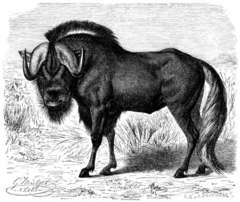
Black wildebeest
Background Information
SOS Children, an education charity, organised this selection. SOS Children works in 45 African countries; can you help a child in Africa?
| Black Wildebeest | |
|---|---|
 |
|
| Conservation status | |
|
Least Concern ( IUCN 3.1) |
|
| Scientific classification | |
| Kingdom: | Animalia |
| Phylum: | Chordata |
| Class: | Mammalia |
| Order: | Artiodactyla |
| Family: | Bovidae |
| Subfamily: | Alcelaphinae |
| Genus: | Connochaetes |
| Species: | C. gnou |
| Binomial name | |
| Connochaetes gnou ( Zimmermann, 1780) |
|
The Black Wildebeest or White-tailed gnu (Connochaetes gnou) is one of two gnu species. The natural populations of this species, endemic to the southern region of Africa, have been almost completely exterminated, but the species has been reintroduced widely, both in private areas and nature reserves throughout most of Lesotho, Swaziland, South Africa, Namibia and Kenya. It was also introduced outside its natural range (Wilson & Reeder, 1993; East, 1989, 1996).
The primal herds were exterminated, being seen as pests, with the secondary advantage of using the hides and meat. Thus this animal exists primarily in herds derived from captive specimens.
The one other species of genus Connochaetes is the Blue Wildebeest, which tended to have a more northerly range.
Its preferred habitat types are grassveld savanna and Karoo of the central South Africa plateau (Lynch, 1983; von Richter, 1974).
